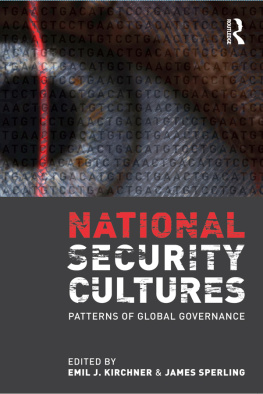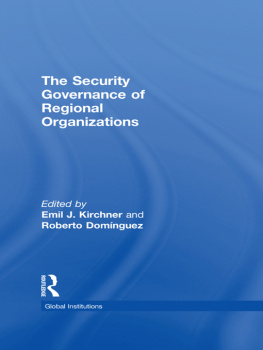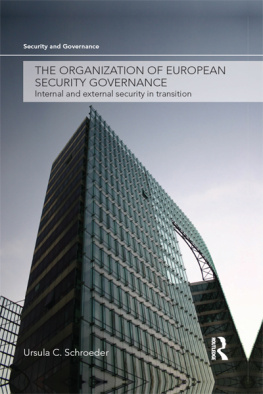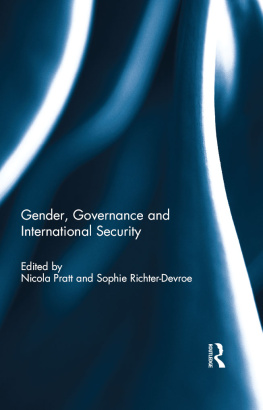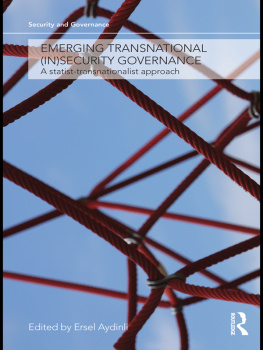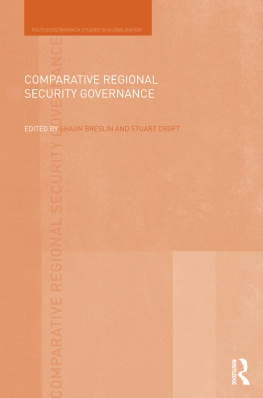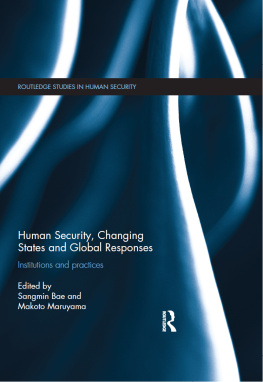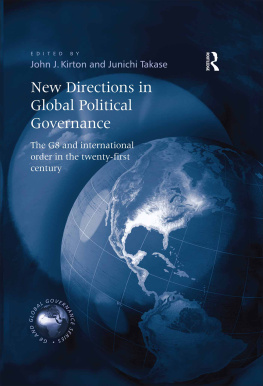National Security Cultures
This edited collection examines changes in national security cultures in the wake of international events that have threatened regional or global order, and analyses the effects of these divergent responses on international security.
Tracing the links between national security cultures and preferred forms of security governance, the work provides a systematic account of perceived security threats and the preferred methods of response with individual chapters on Canada, China, France, Germany, Italy, Japan, Mexico, Russia, the UK and the USA. Each chapter is written to a common template exploring the role of national security cultures in shaping national responses to the four domains of security governance: prevention, assurance, protection and compellence. The volume provides an analytically coherent framework evaluating whether cooperation in security governance is likely to increase among major states, and if so, the extent to which this will follow either regional or global arrangements.
By combining a theoretical framework with strong comparative case studies this volume contributes to the ongoing reconceptualization of security and definition of threat and provides a basis for reaching tentative conclusions about the prospects for global and regional security governance in the early twenty-first century. This makes it ideal reading for all students and policy-makers with an interest in global security and comparative foreign and security policy.
Emil J. Kirchner is Professor of European Studies and Jean Monnet Chair at the University of Essex, UK.
James Sperling is Professor of Political Science at the University of Akron, Ohio.
National Security Cultures offers a tightly argued, deeply researched, and empirically encompassing analysis. It establishes the enduring imprints Westphalian and post-Westphalian state structures have on governance in East and West. And it tracks the variable effects of national security cultures on policies spanning the full governance spectrum. An impressive achievement that will become required reading in the field of security studies.
Peter J. Katzenstein,
Walter S. Carpenter, Jr. Professor of International Studies,
Cornell University
USA
The result of empirical research conducted by an impressive international team of scholars, this is a rigorous and systematic examination of national security cultures across a wide swath of the world. The authors follow a common framework in an exemplary collaborative project which reveals important insights into the fundamental question of the relationship between culture and security policy and the extent to which security concepts in the West can be transferred to other regions.
Stephen F. Szabo
Executive Director of the Transatlantic Academy,
USA
Emil Kirchner and James Sperling have produced a welcome addition to the literature on national security cultures by applying the concept to the pressing problem of global and regional security governance.
Country experts, area specialists, and international relations theorists with an interest in these topics will all want to consult this volume.
John S. Duffield
Professor of Political Science Georgia State University,
USA
Interest in security governance has risen and fallen in the past ten years; now again on the rise, the concept is in great need of theoretical exposition and empirical grounding; and that is what this book achieves. In a welcome and highly ambitious study, the focus on security governance so often constrained to Europe is examined globally. In all these contexts, it is an exceptionally important book.
Stuart Croft
Professor of International Security,
Warwick University, UK
National Security Cultures
Patterns of global governance
Edited by Emil J Kirchner and James Sperling

LONDON AND NEW YORK
First published 2010 by Routledge
2 Park Square, Milton Park, Abingdon, Oxon, OX14 4RN
Simultaneously published in the USA and Canada
by Routledge
270 Madison Avenue, New York, NY 10016
Routledge is an imprint of the Taylor & Francis Group, an informa business
This edition published in the Taylor & Francis e-Library, 2010.
To purchase your own copy of this or any of Taylor & Francis or Routledges collection of thousands of eBooks please go to www.eBookstore.tandf.co.uk.
2010 Editorial selection and matter, Emil J Kirchner & James Sperling;
individual chapters, the contributors
All rights reserved. No part of this book may be reprinted or reproduced or
utilised in any form or by any electronic, mechanical, or other means, now
known or hereafter invented, including photocopying and recording, or in
any information storage or retrieval system, without permission in writing
from the publishers.
British Library Cataloguing in Publication Data A catalogue record for this book is available from the British Library
Library of Congress Cataloging in Publication Data
National security cultures: patterns of global governance / edited by Emil J
Kirchner and James Sperling.
p. cm.
Includes index.
1. Security, International. 2. National security. 3. National security
International cooperation. I. Kirchner, Emil Joseph. II. Sperling, James.
JZ5588.N36 2010
355.033dc22 2009049052
ISBN 0-203-85061-0 Master e-book ISBN
ISBN 13: 978-0-415-77742-1 (hbk)
ISBN 13: 978-0-415-77743-8 (pbk)
ISBN 13: 978-0-203-85061-9 (ebk)
To Tristan, Stefan and Victoria
Contents
JAMES SPERLING
|
BASTIEN IRONDELLE AND SOPHIE BESANCENOT
|
SEBASTIAN HARNISCH AND RAIMUND WOLF
|
PAOLO FORADORI AND PAOLO ROSA
|
MARTIN A. SMITH
|
EMIL J. KIRCHNER
|
OSVALDO CROCI
|
ROBERTO DOMINGUEZ
|
JAMES SPERLING
|
ANTHONY COATES
|
HARUHIRO FUKUI
|
DEREK AVERRE
|
HAN DORUSSEN, EMIL J. KIRCHNER AND JAMES SPERLING
|
Figures
1.1 | A typology of threats |
1.2 | Challenges of governance |
1.3 | Policies of governance |
2.1 | Total aid and bilateral aid 19902007 |
2.2 | Percentage of aid related to GNI |
2.3 | Inquiries into illegal situation of foreigners and actual deportations |
2.4 | French expenditure for defence and homeland security |
2.5 | Homeland security spending |
3.1 | German ODA |
6.1 | EU countries contribution to ODA/DAC |
7.1 | Personnel operational tempo to overall strength 19802004, increasing demand vs falling capacity |

